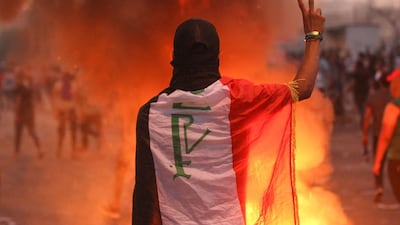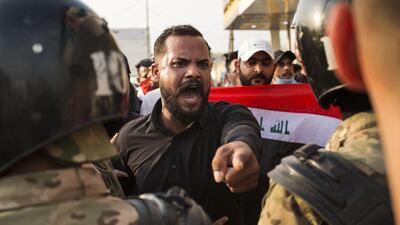A curfew was imposed on Baghdad on Thursday as violent protests that have left at least 33 dead entered their third day.
Iraqi Prime Minister Adel Abdul Mahdi ordered the curfew across the capital starting at 5am local time to stem demonstrations that called for action against unemployment, failing public services and state corruption.
The restrictions will remain in place indefinitely.
Many of those killed, including a police officer, were in the city of Nasiriyah, about 350 kilometres south-east of Baghdad. More than 1,000 people have been wounded, health authorities say.
The anger has been worsened by a near-total internet shutdown, closure of government offices and at least one overnight explosion in the Green Zone, in which some ministries and embassies are located.
On Wednesday, hundreds of heavily armed security troops and riot police were on Baghdad streets, blocking all intersections leading to Tahrir Square.
The clashed quickly spread to at least seven other provinces in the country, with about 3,000 demonstrators in the southern city of Basra staging a largely peaceful protest on Wednesday evening.
The UN is calling for talks between the Iraqi government and protesters.
“We very much regret the loss of life that we have seen over the past few days during the protests,” it said.
Spokesman Stephane Dujarric said on Thursday that the UN welcomed Mr Abdul Mahdi’s announcement of an investigation into the deaths.
“We call for respect of the right of people to assemble freely and peacefully and as a matter of principle we also believe that further violence and excessive use of force must be avoided,” Mr Dujarric said.
He said the UN envoy for Iraq, Jeanine Hennis-Plasschaert, met protesters on Wednesday night in Baghdad and called for calm and dialogue.
“She said that the protesters’ demands for economic reforms, jobs, reliable public services, accountability, prudent and impartial governance are legitimate and longstanding,” Mr Dujarric said.
Ms Hennis-Plasschaert has also met Iraqi authorities and urged them “to exercise maximum restraint in the handling of the protests and to give peaceful protesters space to freely speak their minds, in keeping with the law", Mr Dujarric said.
More than half of those killed in the past three days have been in the southern city of Nasiriyah, where six protesters were shot dead and dozens wounded on Thursday.
Nearby Amarah has also seen bloodshed, with medics and security sources reporting four protesters shot dead on Thursday.
Later in the day, two protesters and a police officer were killed in Diwaniyah, 150km south of Baghdad, and a curfew was imposed.
Rallies began Tuesday in Baghdad but have since spread across the south, including the provinces of Dhi Qar, Missan, Najaf, Basra, Wasit and Babylon.
Riot police in the capital have used water cannon, tear gas, rubber bullets and live rounds to try to disperse protesters from the central Tahrir Square and other areas.
Marchers from different parts of Baghdad tried to converge on the square into the night on Wednesday.
But with internet access virtually shut, demonstrators have struggled to communicate with each other or post footage of the latest clashes.
About 75 per cent of Iraq is offline after major network operators "intentionally restricted" access, cyber-security monitor NetBlocks said.
The protests appear to be mainly spontaneous, with angry crowds carrying Iraqi flags and shunning any involvement by the country's leaders.
The US coalition in Iraq said no American centres were hit in the Green Zone.
"Coalition troops always reserve the right to defend ourselves," the coalition said.
"Attacks on our personnel will not be tolerated. The coalition is here at the invitation of the government of Iraq."
An Iraqi security official said two mortar shells hit the Green Zone, falling in open space and not causing any casualties.
The US embassy in Baghdad issued a warning to its citizens to avoid protest areas.
Many traditional figures have expressed their support for the movement, with populist cleric Muqtada Al Sadr urging "peaceful demonstrations".
Mr Al Sadr was behind the last round of major protests in Baghdad in 2016, when his supporters stormed the Green Zone, but his involvement appears much more limited this time.
The rallies appear to have split officials in Baghdad.
President Barham Salih insisted peaceful protest was a "constitutional right" and Parliament demanded an investigation into the deaths.
But in an unpopular move, Mr Abdul Mahdi blamed the violence on "aggressors who deliberately created casualties".
Two border crossings to Iraq, including one widely used by Iranian pilgrims, have been closed because of the unrest in Iraq, Iran's border guards commander told the semi-official news agency Mehr on Thursday.
Gen Qasem Rezaei said the Khosravi and Chazabeh crossings had been closed since late Wednesday.
A senior Iranian pilgrimage official told state television that the Khosravi border crossing was closed, but other crossings were open ahead of an annual pilgrimage in Iraq.












